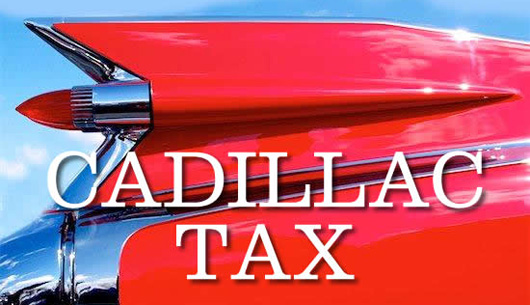
WASHINGTON (PAI) – Top union leaders criticized President Obama’s federal budget proposal for the fiscal year that starts Oct. 1 for Obama’s insistence on keeping the so-called “Cadillac tax” on high-cost health insurance plans.
Obama dismissed their pleas. He proposed only a few tweaks to the levy. The GOP-run Congress, in a monumental insult, not only declared his budget “dead on arrival” but won’t even give Obama the courtesy of holding hearings on it.
The Cadillac tax, which now will not take effect until 2020, took center stage for union leaders, though. All – and their members — want it completely repealed. Obama opposes that.
The budget “makes clear the Affordable Care Act’s so-called ‘Cadillac Tax’ is bad tax policy,” said United Steelworkers President Leo Gerard. “The small changes the president proposes will not fix a tax designed to make working families pay more for their health care.
“USW members already see the effects of this tax at the bargaining table, where employers propose to increase deductibles and co-pays. Our union has strongly supported the bipartisan efforts in Congress to repeal the tax. Full repeal is the only solution.”
“The president has at last recognized the tax on health care plans known as the ‘Cadillac Tax,’ is flawed,” added Laborers President Terry O’Sullivan. “There is no tweaking the tax to make it fair and reasonable, or to avoid the disastrous impacts it will have on the health care of working men and women. It needs to be repealed, and anything other than full repeal robs working people of the health care they have earned.”
“President Obama clearly recognizes the tax on health care plans for working men and women is broken. This harmful and unnecessary tax won’t be fixed by delays or incremental changes. The only real solution is a full repeal and we will not accept anything less,”AFL-CIO President Richard Trumka declared. “We cannot compromise on protecting health care.”
Teachers “remain concerned about proposed fixes to the misnamed ‘Cadillac tax’ because any step short of a full repeal will undermine the progress we made last year, limit our ability to rein in Big Pharma and create new obstacles to affordable healthcare,” added American Federation of Teachers (AFT) President Randi Weingarten.
Aside from the Cadillac tax, the president’s spending plan for the new fiscal year contains other proposals of interest to workers and unions, such as a renewed call for funding universal pre-school education – a top cause of teachers’ unions.
– A 4.9 percent increase in Labor Department spending, including a 21.5 percent increase in Wage and Hour Division enforcement, to beef up pursuit of employer “misclassification” of workers as “independent contractors” and to prepare for expanding worker eligibility for overtime pay. The Occupational Safety and Health Administration would get 7.6 percent more, along with 5.6 percent more for the Mine Safety and Health Administration and 0.4 percent – less than the inflation rate – for the National Labor Relations Board.
– A 1.6 percent raise for federal workers and the military. The Government Employees will lobby for a 5.3 percent hike, President J. David Cox said. “We’re not asking for any spe-cial treatment, just the increases we are owed after six years of low to no increases,” he added.
– A large increase in school funding, notably pre-K funding, which Weingarten praised. “With half our kids in public schools coming from poverty, it’s vital to increase funding so resources are available to the students who need it most, while providing teachers the tools, time and leadership opportunities they need to help our children succeed,” she said.
– A $10 per barrel tax on oil. The budget would dedicate half of the revenue from the oil tax, some $20 billion yearly, to new and greener infrastructure, such as subways.
– A limited Financial Transactions Tax, far less sweeping than the proposals by National Nurses United, Sen. Bernie Sanders, and Rep. Keith Ellison, (D-Minn). The union and the lawmakers would tax all the financial finagling and high-speed transactions Wall Streeters and other speculators engage in. Obama restricts his tax to the largest firms.
– Extending federal jobless benefits to 26 weeks – 52 weeks in high-unemployment states — and including part-time workers, newer workers and “certain low-income and intermittent earners, and workers who leave work for compelling family reasons, like to escape domestic violence.”
Obama would also “establish wage insurance for workers with at least three years of tenure who lose their jobs and take a new job that, at least initially, pays less than their prior job and less than $50,000 per year.” It would pay half the difference from their previous wage, up to $10,000, over two years.
– $75 million to help coal country workers transition to new non-coal jobs as their mines and the power plants they supply close. His budget would also shore up coal miners’ benefits, now funded through federal fees levied on coal output under a 70-year-old law.
“The budget revises the formula for transfers of funds to the UMWA 1993 Health Benefit Plan by taking into account all beneficiaries in that plan as of this proposal’s enactment,” it explains. It “further accounts for retirees whose benefits were denied or reduced as the result of a bituminous coal industry bankruptcy proceeding” that began in 2012. Obama would also “transfer funds to the Pension Benefit Guaranty Corporation” to protect “the long-term solvency of the 1974 UMWA Pension Plan and Trust. That plan is significantly underfunded and approaching insolvency. Transfers would continue until that plan is fully funded.”
Photo: stock image

MOST POPULAR TODAY


Zionist organizations leading campaign to stop ceasefire resolutions in D.C. area

High Court essentially bans demonstrations, freedom of assembly in Deep South

Communist Karol Cariola elected president of Chile’s legislature

Afghanistan’s socialist years: The promising future killed off by U.S. imperialism






Comments